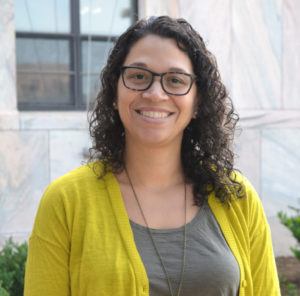PROFILE: Amber Weaver, Sustainability Manager, Asheville, NC

Amber Weaver
Sustainability Manager
Asheville, NC
Amber Weaver and Bridget Herring head up the Office of Sustainability in Asheville, North Carolina. They work hard to be innovative in their policy, driven by their love for the environment and community. Although they haven’t been a part of SSDN for very long, they value the ability to connect with others through the network that face similar challenges.
Why SSDN?
We’ve worked on The Asheville Workplace challenge with SSDN but we haven’t had a lot of involvement so far because we’ve been so busy. We do call colleagues to discuss ideas, mostly North Carolina folks because they face many of the same challenges. Those connections have been valuable to have but there simply hasn’t been enough time to do more than collaborate informally.
What are you working on?
- Food Policy Action Plan
This plan pertains to food resilience and urban agriculture. It focuses on protecting urban farmers, supporting healthy living and ensuring that it is all possible. They look to use idle city property for urban farming and grow edible foods. But how can the city support urban agriculture? The department is trying to get health points for employees joining CSA programs. They are also able to rent space to farmers, compost on city property, and figure out ways to protect and create farmland in the area.
- Climate Resiliency Plan
This looks at city assets, both internal and external, and how to make them more resilient. Flooding, landslides, and drought, wildfire, and nuisance flooding are the biggest threats. Major assets, including city and commercial buildings, residential homes, water reservoirs, natural resources, and food locations, are considered. For example, land along greenways that cant be developed can be used for farming.
- 80% Carbon Reduction Plan
In 2009 the city started reducing its carbon emissions. This includes all energy to operate municipal buildings and fuel for city vehicles. Some projects include retrofitting lighting in parking lots, installing solar hot water in fire stations, and upgrading vehicles to be more sustainable. In addition to this, the mayor signed the Paris Climate Accord to ensure that as policy is rolled back at the federal level cities are standing up for climate change work.
- 50% waste reduction plan
How to recycle more and compost more? The ultimate goal is zero waste from city buildings and residential properties. By 2035 the goal is 50% reduction. Momentum in the area is around compost but there has to be an infrastructure for it. In order to make it a viable possibility to have city composting there needs to be a transfer station for trucks. This would most likely come from a private partner.
- Community Clean Energy Policy Framework Plan
Training for city staff and community and building professionals on incentives for building is key, especially because the state mandates building codes. This is frustrating for some but making sure people are aware of incentives and options to do better makes a difference. They try to figure out models to allow commercial and residential properties to take advantage of sustainable energy. One example is the Asheville workplace challenge that looks to external customers and provides them the opportunity to work on their buildings and learn about opportunities to be more sustainable in their practice.
Why do you do what you do?
Amber: I got into sustainability because I love it. When I went to college I wanted to do things to help the world and community. I have a great love for the outdoors. Getting where I am now was a natural process. I’ve worked in water resources, with Keep America Beautiful, and on recycling and waste efforts. All of that has culminated in the work I do now.
Bridget: I Love trees. That has always been imbedded in my life. I’ve worked for recycling, as well as an air quality nonprofit. Honestly though, it all comes back to my love for trees. It is also important when working in sustainability to learn what is sustainable for you. I’ve had to be conscious to balance my work and life.